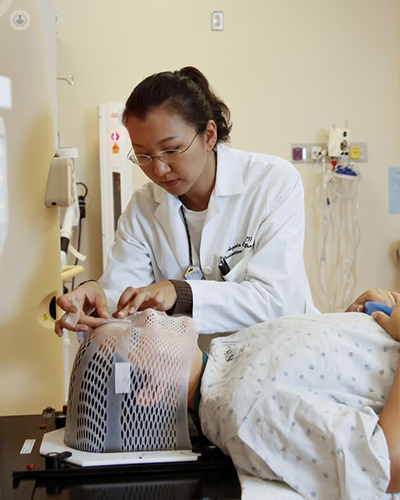An expert guide: What is Gamma Knife radiation therapy?
Written by:At the forefront of advances in neurosurgery, Gamma Knife radiation therapy can offer excellent outcomes for patients suffering from a range of conditions affecting the brain, including tumours, vascular malformations and pain conditions amongst others. In this illuminating article, renowned consultant neurosurgeon Mr Neil Kitchen, who is medical director of the Queen Square Gamma Knife Unit, gives expert insight on Gamma Knife treatment and its applications.

What is Gamma Knife radiation therapy?
Gamma Knife radiation therapy is a way of delivering highly focused radiation to lesions in the brain that are generally inaccessible to open neurosurgery.
What conditions can Gamma Knife be used to treat?
Gamma Knife is used to treat a variety of both benign (non-cancerous) and malignant (cancerous) conditions in the brain. This includes metastatic brain tumours, which have spread from other cancers found elsewhere in the body as well as common benign intracranial tumours, such as meningiomas and schwannomas.
Additionally, Gamma Knife can be used to treat some pain conditions, such as trigeminal neuralgia, and some vascular problems such as brain arteriovenous malformations (AVMs). Although AVMs have, in many cases, been present in the patient for many years, they carry an ongoing risk of brain haemorrhage so treatment is required.
Who is a good candidate for Gamma Knife radiation therapy?
A patient’s suitability for Gamma Knife treatment depends on the condition or disease that requires treatment. Generally speaking, Gamma Knife is at its most useful and effective and also carries the least risk, the smaller the target of the radiation treatment. This is because the side effects of radiation increase the larger the size of the target.
Additional to this, we also have to assess the presentation and development of the individual patient’s condition. For example, in patients with brain metastatic tumours, their suitability for Gamma Knife treatment depends on the number of tumours, the burden of the disease in the brain and how the patients is fairing in terms of cancer elsewhere in the body.
Therefore, on the one hand, there are technical aspects which determine what makes a good candidate for Gamma Knife treatment but on the other hand, there are also important clinical aspects to consider.
How effective is Gamma Knife radiation therapy?
Much like open neurosurgery, good patient selection is the key to effective treatment using Gamma Knife radiation therapy. If patients are well selected, the outcomes are very good. For example, we know that we can control the growth of metastatic tumours in over ninety-five per cent of cases. In trigeminal neuralgia, if a patient has true neuralgia and is otherwise a good candidate, we get very good pain relief from this type of treatment.
The effectiveness of Gamma Knife radiation therapy can be compromised when the indications for patients are stretched and some people are put forward for treatment who are not as likely to benefit from it as prime candidates would be.
What are the potential risks and complications?
The main risks of Gamma Knife are that unlike open brain surgery, there are delays and no marked changes immediately occur following treatment. Therefore, any potential side effects don’t tend to appear until several weeks or months later.
This is due to the effect of the radiation on the lesion in question. For example, in trigeminal neuralgia, some patients get facial numbness appearing several months following treatment which is caused by the radiation’s effect on the nerve. Conversely when one treats tumours, they can swell up after a few months and that can cause either pain or headache and even seizures in some cases.
Another aspect is related to the small amount of radiation that affects the brain tissue surrounding the target. This can also cause a brain reaction, which can lead to side effects such as headache, weakness or seizures.
What is the recovery process like after Gamma Knife radiation treatment?
Gamma Knife radiation therapy is nearly always performed under local anaesthesia as a day case. Therefore, when recovering from the treatment, patients may have a slight headache or feel out of sorts for a day or so. This is a positive but, unlike open surgery, issues can occur later on which may then require further recovery.
Do patients often require repeat treatments?
Most patients only have Gamma Knife treatment once, as it is not what we call fractionated treatment. However, if it is successful in treating the patient’s condition and they later go on to have a recurrence, they may repeat the treatment.
Mr Neil Kitchen is one of the country’s leading experts in Gamma Knife radiation treatment. If you wish to book a consultation with him, you can do so by visiting his Top Doctors profile.


